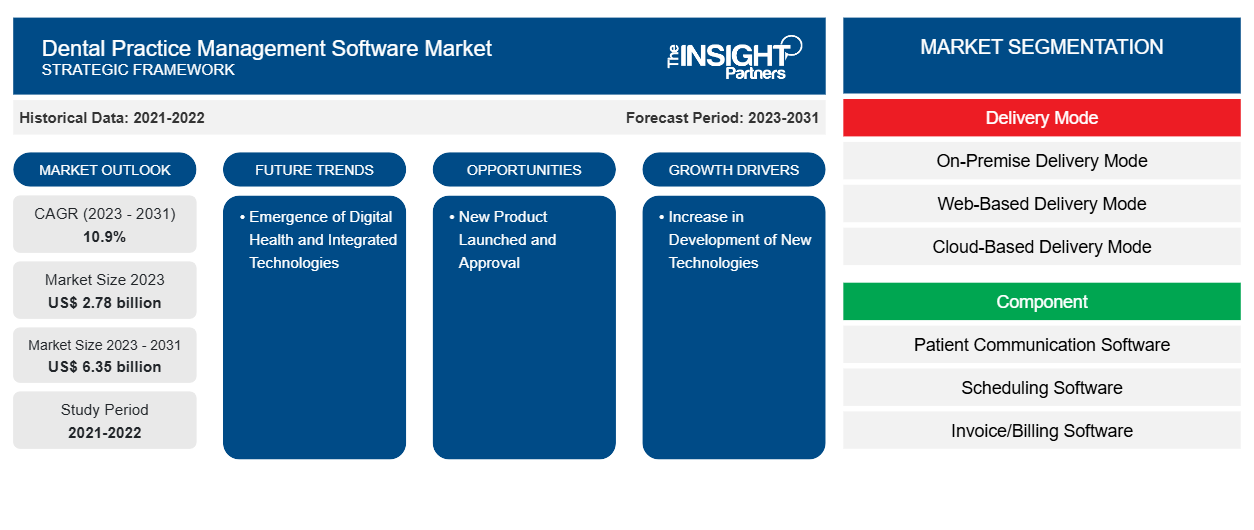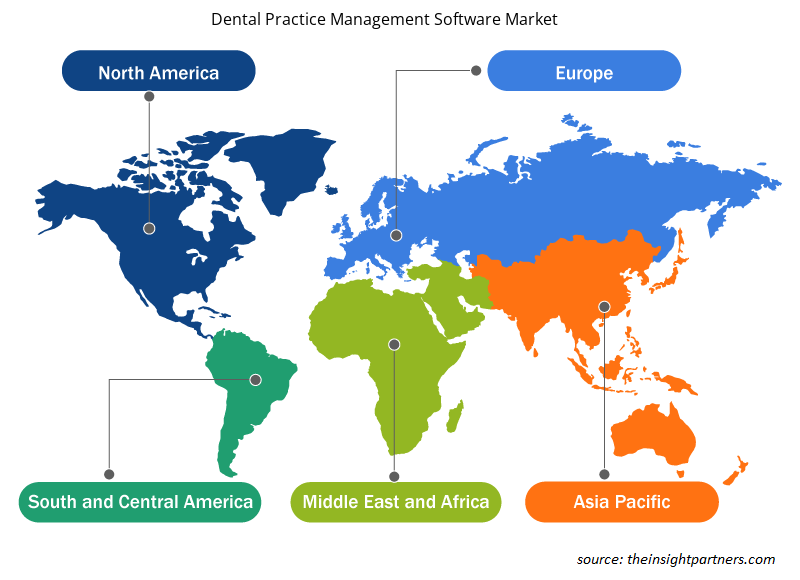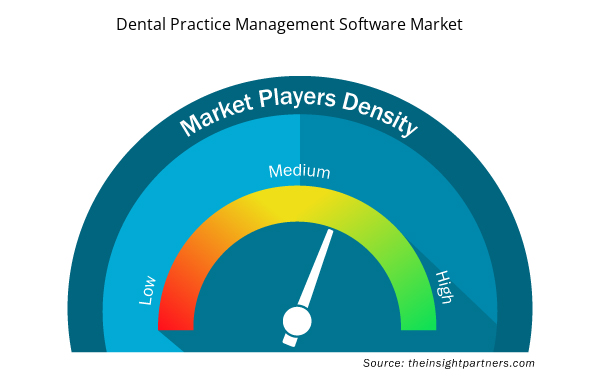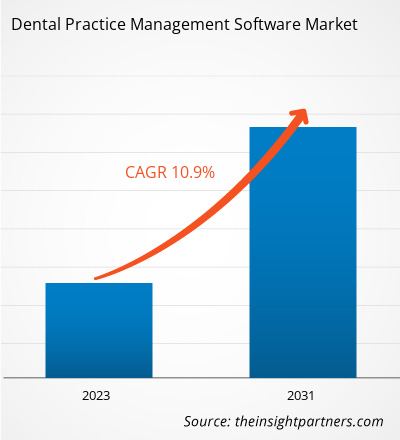The dental practice management software market was valued at US$ 2.78 billion in 2023 and is expected to reach US$ 6.35 billion by 2031. The market is expected to register a CAGR of 10.9% in 2023–2031. The emergence of digital health and integrated technologies will likely remain a key dental practice management software market trend.
Dental Practice Management Software Market Analysis
Dental practice management software is used to help dentists tackle unique challenges. These solutions are easy-to-handle cloud-based software that helps smooth clinical and administrative routines and deliver powerful tools for managing dental clinic data. The dental practice management software provides templates for dental practices that can import and organize tooth, X-rays, and gum graphics. This leads to increasing use of this software by the dental practitioner and thereby drives the demand for dental practice management software.
Dental Practice Management Software Market Overview
Most patients worldwide face tooth loss due to accidents, periodontal diseases, injuries, tooth decay, and others. The rising prevalence and recurrent nature of dental caries and periodontal disease increase the demand for endodontic treatment procedures. For instance, tooth decay and periodontal disease are the two main risks to dental health. According to the Centre for Disease Control and Prevention, adults over 30 who have periodontal disease have a rate of 47.2%. The prevalence of periodontal disease increases with age; among adults 65 and over, 70.1% have the condition. Men are more likely than women to have this condition (56.4% vs. 38.4%). Thus, a high prevalence of dental diseases is likely to boost dentists' adoption of dental practice management software in the coming years.
Customize This Report To Suit Your Requirement
You will get customization on any report - free of charge - including parts of this report, or country-level analysis, Excel Data pack, as well as avail great offers and discounts for start-ups & universities
Dental Practice Management Software Market: Strategic Insights

- Get Top Key Market Trends of this report.This FREE sample will include data analysis, ranging from market trends to estimates and forecasts.
You will get customization on any report - free of charge - including parts of this report, or country-level analysis, Excel Data pack, as well as avail great offers and discounts for start-ups & universities
Dental Practice Management Software Market: Strategic Insights

- Get Top Key Market Trends of this report.This FREE sample will include data analysis, ranging from market trends to estimates and forecasts.
Dental Practice Management Software Market Drivers and Opportunities
Increase in Development of New Technologies to Favor Market
Data collected during a dental procedure can be managed using a safer, more standardized information system called cloud-based delivery mode. With the help of the cloud-based system, users can access data on any device anytime by connecting to the computer via the internet or a web browser. Commercial and academic institutions can manage laboratory data generated from tasks like sample testing, instrument usage, automation, and report generation more easily with the help of the cloud-based delivery mode. An incredibly controllable substitute that facilitates access to real-time data about patients, staff, and devices on a healthcare facility's grounds is a cloud-based delivery mode system. Entteri, a Finland-based company in the dental sector, offers Romexis AssisDent, an example of a cloud-based delivery method. Romexis AssisDent increases the clinic's output to the fullest. Every stage of the patient experience is covered, including making appointments and reminding patients to follow up. It also provides sophisticated tools for business reporting. Process automation has made a variety of management solutions available to patients.
New Product Launched and Approval – An Opportunity in Dental Practice Management Software Market
The healthcare industry is constantly developing significantly due to the increasing global demand from a large population, which has increased new product development, product launches, and approvals. Additionally, major market players are engaged in investing in research and development activities to ensure the innovation and development of efficient products. For instance, in September 2022, Carestream Dental launched a new cloud-based practice management software solution for oral and maxillofacial surgery. According to a press release from Carestream, this solution, known as Sensei Cloud for Oral Surgery, is intended for accessible, user-friendly management solutions for oral and maxillofacial surgery (OMS) specialists. In January 2024, Smilefy, Inc. released Smilefy 4.0, a 3D smile design program powered by Al. Dentists can create print-ready 3D models, design 3D smiles, and offer patients a trial to see their new smiles before committing. This establishes realistic expectations and facilitates communication.
Dental Practice Management Software Market Report Segmentation Analysis
Key segments contributing to the dental practice management software market analysis derivation are delivery mode and component.
- Based on delivery mode, the dental practice management software market is divided into on-premise delivery mode, web-based delivery mode, and cloud-based delivery mode. The web-based delivery mode segment held a larger market share in 2023.
- By component, the market is segmented into patient communication software, scheduling software, insurance management software, invoice/billing software, and other components. The scheduling software segment held the largest share of the market in 2023.
Dental Practice Management Software Market Share Analysis by Geography
The dental practice management software market report's geographic scope is divided into five regions: North America, Asia Pacific, Europe, Middle East & Africa, and South America/South & Central America. North America held the major share of the market in 2023. The US dental practice management software market is growing, followed by Canada. The healthcare sector in the North America region has been witnessing rapid transformation in dental care. Furthermore, an increase in spending on dental care is likely to drive the growth of the dental practice management software market. Without insurance, the typical adult in America who has excellent dental health overall—only a few minor issues like cavities—spends US$ 1,000 annually on dental care. The United States spends approximately US$ 130 billion annually on dental care, which is rising. The aging American population, rising interest in cosmetic dentistry, and developments in dental technology are the main factors fuelling this expansion.
Dental Practice Management Software Market Regional Insights
The regional trends and factors influencing the Dental Practice Management Software Market throughout the forecast period have been thoroughly explained by the analysts at Insight Partners. This section also discusses Dental Practice Management Software Market segments and geography across North America, Europe, Asia Pacific, Middle East and Africa, and South and Central America.

- Get the Regional Specific Data for Dental Practice Management Software Market
Dental Practice Management Software Market Report Scope
| Report Attribute | Details |
|---|---|
| Market size in 2023 | US$ 2.78 billion |
| Market Size by 2031 | US$ 6.35 billion |
| Global CAGR (2023 - 2031) | 10.9% |
| Historical Data | 2021-2022 |
| Forecast period | 2023-2031 |
| Segments Covered |
By Delivery Mode
|
| Regions and Countries Covered | North America
|
| Market leaders and key company profiles |
Dental Practice Management Software Market Players Density: Understanding Its Impact on Business Dynamics
The Dental Practice Management Software Market is growing rapidly, driven by increasing end-user demand due to factors such as evolving consumer preferences, technological advancements, and greater awareness of the product's benefits. As demand rises, businesses are expanding their offerings, innovating to meet consumer needs, and capitalizing on emerging trends, which further fuels market growth.
Market players density refers to the distribution of firms or companies operating within a particular market or industry. It indicates how many competitors (market players) are present in a given market space relative to its size or total market value.
Major Companies operating in the Dental Practice Management Software Market are:
- Carestream Dental, LLC.
- Curve Dental, Inc.
- Datacon Dental Systems
- Epic Systems Corporation
- Dentimax
- Henry Schein, Inc.
Disclaimer: The companies listed above are not ranked in any particular order.

- Get the Dental Practice Management Software Market top key players overview
Dental Practice Management Software Market News and Recent Developments
The dental practice management software market is evaluated by gathering qualitative and quantitative data post primary and secondary research, which includes important corporate publications, association data, and databases. The following is a list of developments in the market for dental practice management software and strategies:
- Planet DDS, the leading provider of cloud-based dental software, today announced it has completed the acquisition of Cloud 9 Software from Accel-KKR, an investment firm focused on software and tech-enabled businesses. The acquisition of Cloud 9 allows Planet DDS to continue its strong growth path as a multi-specialty dental software platform while adding the strength and experience of Cloud 9 in orthodontic and pediatric practice management software. (Source: Planet DDS Company Name, Press Release, 2023)
- 123Dentist, Altima Dental, and Lapointe Group have entered into a merger agreement to create one of the largest dental support organizations in Canada, with nearly 350 supported dental practices. The transaction is being financed through equity capital provided by 123Dentist’s existing financial partner, Peloton Capital Management; new investors KKR, a leading global investment firm, and Heartland Dental, a KKR portfolio company and the leading dental support organization in the U.S.; and Sentinel Capital Partners, Altima Dental’s existing financial partner. (Source: 123Dentist Company Name, Press Release, 2022)
Dental Practice Management Software Market Report Coverage and Deliverables
The “Dental Practice Management Software Market Size and Forecast (2021–2031)” report provides a detailed analysis of the market covering below areas:
- Market size and forecast at global, regional, and country levels for all the key market segments covered under the scope
- Market dynamics such as drivers, restraints, and key opportunities
- Key future trends
- Detailed PEST/Porter’s Five Forces and SWOT analysis
- Global and regional market analysis covering key market trends, major players, regulations, and recent market developments
- Industry landscape and competition analysis covering market concentration, heat map analysis, prominent players, and recent developments
- Detailed company profiles
- Historical Analysis (2 Years), Base Year, Forecast (7 Years) with CAGR
- PEST and SWOT Analysis
- Market Size Value / Volume - Global, Regional, Country
- Industry and Competitive Landscape
- Excel Dataset


- Retinal Imaging Devices Market
- Artwork Management Software Market
- Electronic Signature Software Market
- Microplate Reader Market
- Portable Power Station Market
- Quantitative Structure-Activity Relationship (QSAR) Market
- Asset Integrity Management Market
- Space Situational Awareness (SSA) Market
- Volumetric Video Market
- Public Key Infrastructure Market

Report Coverage
Revenue forecast, Company Analysis, Industry landscape, Growth factors, and Trends

Segment Covered
Delivery Mode , Component and Geography

Regional Scope
North America, Europe, Asia Pacific, Middle East & Africa, South & Central America

Country Scope
Argentina, Australia, Brazil, Canada, China, France, Germany, India, Italy, Japan, Mexico, Saudi Arabia, South Africa, South Korea, Spain, United Arab Emirates, United Kingdom, United States

 Get Free Sample For
Get Free Sample For